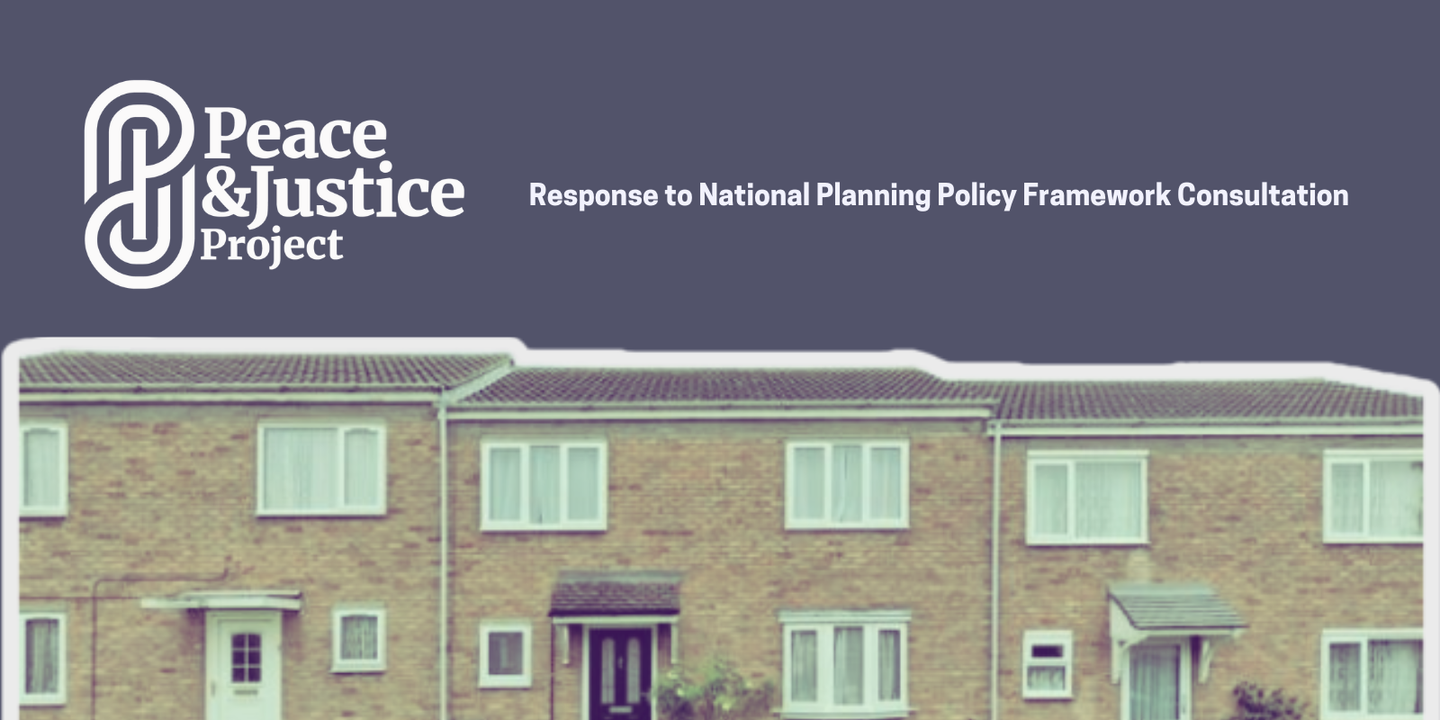The NPPF is an important document, which sets out the parameters for urban development for years ahead. Urban and rural planning impacts everyone and badly planned development blights lives for years to come. Planning permission, once given, cannot be revoked. Eight weeks, spanning a traditional holiday period, is not enough time for organisations and individuals to read the 84 page document and to reflect on the 106 questions asked.
We start from the position that safe, secure housing is a fundamental right for all. Housing and economic, social and environmental sustainability are linked together and the aim of government should be to provide well-designed and attractive settlements that people can be proud of, with good transport links, that support active travel, with easy access to green spaces and employment opportunities.
Despite its claims for reform, the revised NPPF document tinkers with a planning model for housing provision that has exacerbated the housing crisis and not solved it. Allocating land for housing and relaxing rules on policy does not ensure that housing is actually built. The London Plan (2021) which has firm targets for all London boroughs has only achieved 56% of its running total.
The NPPF continues the assumption, first proposed by the Thatcher government forty years ago, that housing needs will be met through the private market. This flies in the face of experience. The current housing crisis is a crisis of affordability, both for renters and buyers. Current definitions of ‘affordability’ used in policy do not relate to incomes, ‘affordable rents’ at 80% of the market rate prices tenants out of their homes.
While land value capture is an essential tool for public authorities to redistribute wealth, the current system of negotiating developer contributions for essential infrastructure and the provision of social housing, combined with inequalities in resources between planning authorities and major developers and volume house builders, has resulted in a severe shortage of social housing. The Competition and Market Authority observe that housing targets have only been achieved where there has been “significant supply by local authority building”. The revised NPPF does not refer to increasing the supply of council housing anywhere in the document.
We conclude that the proposed reforms are unlikely to resolve the housing crisis. We repeat our call for a programme of council housebuilding, funded directly by government, targeted at areas where the affordability crisis is greatest.
Furthermore, we are concerned that the proposals will damage the built and natural environment and the countryside.
The proposed revision to allow local planning authorities (LPAs) to ‘passport’ proposals on brownfield land as acceptable in principle, will as JustSpace points out, force LPA’s to accept badly designed schemes, especially as they have to meet their increased housing targets. Council estates which need refurbishment in major cities have been identified as brownfield sites. We support the London Federation of Tenants in their objections to ‘passporting’ since regeneration schemes on these estates have most often led to the loss of council and social rented housing and its replacement by homes sold on the open market.
Over-densification and the construction of high residential towers has been a feature of the last two decades of house building. The amendments to the NPPF do nothing to address this issue and references to an ‘uplift’ in densities proposed may indeed exacerbate the problem.
The most controversial proposal continues the previous Conservative government’s category of ‘grey belt’ land, which was introduced in December 2023. The revision further widens its definition. This is likely to lead to developers allowing land to degrade, then to LPA’s permitting them to build in unsuitable places, for example in piecemeal speculatively built housing schemes on the urban fringe.
The designation of ‘grey belt’ sites for housing is also likely to undermine the successful creation of green spaces, pocket parks and green links which are highly prized and popular with residents living in densely built-up areas. The pandemic demonstrated the value of such spaces.
We are alarmed at the Government’s decision to allow further building on the green belt. The NPPF’s proposed ‘Golden Rules’ for developments which will be permitted on previously designated green belt land require an inadequate proportion of social housing – particularly because the definitions of ‘affordable’ and ‘social housing’ are insufficient in themselves. Planning consultants have commented that this ‘reform’ is likely to lead to a dual market in land. Developers will be particularly attracted to these potential sites. We agree with the countryside charity (CPRE), that green belts are the ‘countryside next door’ for 30m people and urge the government to continue their protection.
We welcome the government’s ambition to move towards a sounder system for forward planning, with a requirement for cross-border co-operation between LPA’s, the devolution of planning powers to mayoral authorities and the requirement to produce spatial development strategies across economically functional areas. These ambitions will not be met, however, without substantial investment in planning staff and planning expertise.
In conclusion, the Peace & Justice Project calls on the government to solve the housing crisis using other measures than a dash to enable a small number of volume housebuilders to construct large numbers of speculatively built dwellings for the private market. There are different policy levers available, such as a rent freeze and rent controls, the compulsory acquisition of vacant properties and stricter controls on short-term letting and second homes. We will continue to campaign for a major government funded programme of council house building. The rent model of council house building, which is eternally under threat, must be protected, alongside secure tenancies. Such reforms would be targeted at people in situations of housing precarity and be more reliable, secure and economically sustainable.
We encourage wider engagement with the NPPF consultation. Please consider supporting our submission here.
